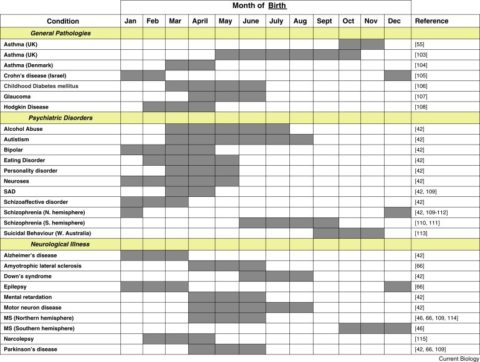 According to a post from Stuart Farrimond, there’s a wealth of data showing that your month of birth actually has a very small but noticeable difference in your long-term health. Not because of astrological nonsense, but because of exposure to sunlight, disease and other factors during critical developmental periods. For example, spring babies end up growing to be a quarter of an inch 6mm taller than autumn babies on average.
According to a post from Stuart Farrimond, there’s a wealth of data showing that your month of birth actually has a very small but noticeable difference in your long-term health. Not because of astrological nonsense, but because of exposure to sunlight, disease and other factors during critical developmental periods. For example, spring babies end up growing to be a quarter of an inch 6mm taller than autumn babies on average.
Some medical conditions are correlated with birth month. Schizophrenia is uncommon but the relative risk is increased 10% if you are born in the winter. May in the North isn’t good for multiple sclerosis, although November is riskiest for those in the Southern hemisphere.
I assume that the position you are in the school year affects much of your growth, development and health too, to some extent. If you’re born in September, you’ll be among the oldest in the school year. August babies, the youngest. That influences whether you’re ready to join a sports team at the beginning of the school year, for instance, which could have knock on effects throughout your student days.
A nice graphic in Current Biology charts the year and the risk of particular illnesses for each month. They’re all more than statistical chance and of course absolutely nothing to do with star sign. But, then I’m an Aquarius, always skeptical.
What’s the best month to be born?
![]() Foster, R., & Roenneberg, T. (2008). Human Responses to the Geophysical Daily, Annual and Lunar Cycles Current Biology, 18 (17) DOI: 10.1016/j.cub.2008.07.003
Foster, R., & Roenneberg, T. (2008). Human Responses to the Geophysical Daily, Annual and Lunar Cycles Current Biology, 18 (17) DOI: 10.1016/j.cub.2008.07.003